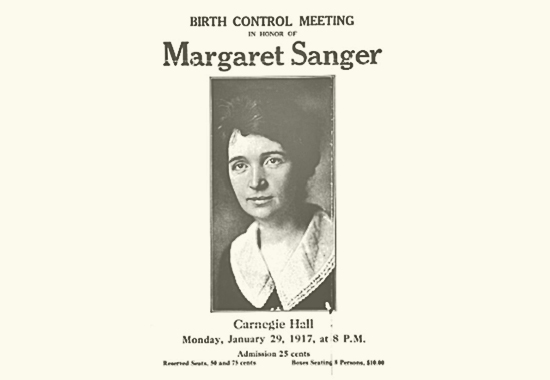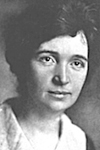|

BIRTH CONTROL MEETING FLYER -
MARGARET SANGER 1917
The Morality of Birth Control

 |
The meeting
tonight is a postponement of one which was to |
have taken place
at the Town Hall last Sunday evening. It was to
be a culmination of a three day conference, two
of which were held at the Hotel Plaza, in
discussing the Birth Control subject in its
various and manifold aspects.
The one issue upon which there seems to be most
uncertainty and disagreement exists in the moral
side of the subject of Birth Control. It seemed
only natural for us to call together scientists,
educators, members of the medical profession and
the theologians of all denominations to ask
their opinion upon this uncertain and important
phase of the controversy. Letters were sent to
the most eminent men and women in the world. We
asked in this letter, the following questions:
1. Is
over-population a menace to the peace of the
world?
2. Would the legal dissemination of
scientific Birth Control information through
the medium of clinics by the medical
profession be the most logical method of
checking the problem of over-population?
3. Would knowledge of Birth Control change
the moral attitude of men and women toward
the marriage bond or lower the moral
standards of the youth of the country?
4. Do you believe that knowledge which
enables parents to limit the families will
make for human happiness, and raise the
moral, social and intellectual standards of
population?
We sent such a letter not only to those who, we
thought, might agree with us, but we sent it
also to our known opponents. Most of these
people answered. Every one who answered did so
with sincerity and courtesy, with the exception
of one group whose reply to this important
question as demonstrated at the Town Hall last
Sunday evening was a disgrace to liberty-loving
people, and to all traditions we hold dear in
the United States. I believed that the
discussion of the moral issue was one which did
not solely belong to theologians and to
scientists, but belonged to the people. And
because I believed that the people of this
country may and can discuss this subject with
dignity and with intelligence I desired to bring
them together, and to discuss it in the open.
When one speaks of moral, one refers to human
conduct. This implies action of many kinds,
which in turn depends upon the mind and the
brain. So that in speaking of morals one must
remember that there is a direct connection
between morality and brain development. Conduct
is said to be action in pursuit of ends, and if
this is so, then we must hold the
irresponsibility and recklessness in our action
is immoral, while responsibility and forethought
put into action for the benefit of the
individual and the race becomes in the highest
sense the finest kind of morality.
We know that every advance that woman has made
in the last half century has been made with
opposition, all of which has been based upon the
grounds of immorality. When women fought for
higher education, it was said that this would
cause her to become immoral and she would lose
her place in the sanctity of the home. When
women asked for the franchise it was said that
this would lower her standard of morals, that it
was not fit that she should meet with and mix
with the members of the opposite sex, but we
notice that there was no objection to her
meeting with the same members of the opposite
sex when she went to church.
The church has ever opposed the progress of
woman on the ground that her freedom would lead
to immorality. We ask the church to have more
confidence in women. We ask the opponents of
this movement to reverse the methods of the
church, which aims to keep women moral by
keeping them in fear and in ignorance, and to
inculcate into them a higher and truer morality
based upon knowledge. And ours is the morality
of knowledge. If we cannot trust woman with the
knowledge of her own body, then I claim that two
thousand years of Christian teaching has proved
to be a failure.
We stand on the principle that Birth Control
should be available to every adult man and
woman. We believe that every adult man and woman
should be taught the responsibility and the
right use of knowledge. We claim that woman
should have the right over her own body and to
say if she shall or if she shall not be a
mother, as she sees fit. We further claim that
the first right of a child is to be desired.
While the second right is that it should be
conceived in love, and the third, that it should
have a heritage of sound health.
Upon these principles the Birth Control movement
in America stands. When it comes to discussing
the methods of Birth Control, that is far more
difficult. There are laws in this country which
forbid the imparting of practical information to
the mothers of the land. We claim that every
mother in this country, either sick or well, has
the right to the best, the safest, the most
scientific information. This information should
be disseminated directly to the mothers through
clinics by members of the medical profession,
registered nurses and registered midwives.
Our first step is to have the backing of the
medical profession so that our laws may be
changed, so that motherhood may be the function
of dignity and choice, rather than one of
ignorance and chance. Conscious control of
offspring is now becoming the ideal and the
custom in all civilized countries. Those who
oppose it claim that however desirable it may be
on economic or social grounds, it may be abused
and the morals of the youth of the country may
be lowered. Such people should be reminded that
there are two points to be considered. First,
that such control is the inevitable advance in
civilization. Every civilization involves an
increasing forethought for others, even for
those yet unborn. The reckless abandonment of
the impulse of the moment and the careless
regard for the consequences, is not morality.
The selfish gratification of temporary desire at
the expense of suffering to lives that will come
may seem very beautiful to some, but it is not
our conception of civilization, or is it our
concept of morality.
In the second place, it is not only inevitable,
but it is right to control the size of the
family for by this control and adjustment we can
raise the level and the standards of the human
race. While Nature’s way of reducing her numbers
is controlled by disease, famine and war,
primitive man has achieved the same results by
infanticide, exposure of infants, the
abandonment of children, and by abortion. But
such ways of controlling population is no longer
possible for us. We have attained high standards
of life, and along the lines of science must we
conduct such control. We must begin farther back
and control the beginnings of life. We must
control conception. This is a better method, it
is a more civilized method, for it involves not
only greater forethought for others, but finally
a higher sanction for the value of life itself.
Society is divided into three groups. Those
intelligent and wealthy members of the upper
classes who have obtained knowledge of Birth
Control and exercise it in regulating the size
of their families. They have already benefited
by this knowledge, and are today considered the
most respectable and moral members of the
community. They have only children when they
desire, and all society points to them as types
that should perpetuate their kind.
The second group is equally intelligent and
responsible. They desire to control the size of
their families, but are unable to obtain
knowledge or to put such available knowledge
into practice.
The third are those irresponsible and reckless
ones having little regard for the consequence of
their acts, or whose religious scruples prevent
their exercising control over their numbers.
Many of this group are diseased, feeble-minded,
and are of the pauper element dependent entirely
upon the normal and fit members of society for
their support. There is no doubt in the minds of
all thinking people that the procreation of this
group should be stopped. For if they are not
able to support and care for themselves, they
should certainly not be allowed to bring
offspring into this world for others to look
after. We do not believe that filling the earth
with misery, poverty and disease is moral. And
it is our desire and intention to carry on our
crusade until the perpetuation of such
conditions has ceased.
We desire to stop at its source the disease,
poverty and feeble-mindedness and insanity which
exist today, for these lower the standards of
civilization and make for race deterioration. We
know that the masses of people are growing wiser
and are using their own minds to decide their
individual conduct. The more people of this kind
we have, the less immorality shall exist. For
the more responsible people grow, the higher do
they and shall they attain real morality.

The
Margaret Sanger Papers Project, New York
University, has the copyright to this speech
transcript. Used with permission.
More History
|
|